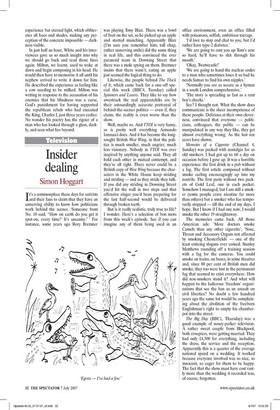Insider dealing
Simon Hoggart ITt's a commonplace these days for satirists their fans to claim that they have an unnerving ability to know how politicians work behind the scenes. 'Someone from No. 10 said, "How on earth do you get it spot-on, every time? It's uncanny."' For instance, some years ago Rory Bremner was playing Tony Blair. There was a bowl of fruit on the set, so he picked up an apple and started munching. Apparently Blair (I'm sure you remember him; tall chap, rather unnerving smile) did the same thing in real life, and this convinced the ever paranoid team in Downing Street that there was a mole spying on them. Bremner insists that there wasn't; eating an apple just seemed the logical thing to do.
Likewise, the people behind The Thick of It, which came back for a one-off special this week (BBC4, Tuesday) called Spinners and Losers. They like to say how awestruck the real apparatchiks are by their astoundingly accurate portrayal of behind-the-scenes politics — even if, they claim, the reality is even worse than the show.
Well, maybe so. And TTOI is very funny, as is pretty well everything Armando Iannucci does. And it has become the longsought British West Wing, in that the politics is much smaller, much angrier, much less visionary. Nobody in TTOI was ever inspired by anything anyone said. They all hold each other in mutual contempt, and they're all right. There never could be a British copy of West Wing because the characters in the White House keep striding and striding — and as they stride they talk. If you did any striding in Downing Street you'd hit the wall in two steps and that offensive zinger you'd been preparing for the last half-second would be delivered through broken teeth.
But is it really realistic, truly true to life? I wonder. Here's a selection of bon mots from this week's episode. See if you can imagine any of them being used in an office environment, even an office filled with poisonous, selfish, ambitious toerags.
'I'd love to stop and chat to you, but I'd rather have type-2 diabetes.'
'We are going to ram you up Tom's arse so hard, he'll have to shit through his mouth.'
'Okay, Twatweazle!'
'We are going to hand the nuclear codes to a man who sometimes loses it so bad he needs Satnav to find his own nipples.'
'Normally you are as secure as a hymen in a south London comprehensive.'
'The story is spreading as fast as a rent boy's cheeks.'
See? I thought not. What the show does communicate is the sheer incompetence of these people. Delirious at their own cleverness, convinced that everyone — politicians, colleagues, the public — can be manipulated in any way they like, they get almost everything wrong. As the last ten years have shown.
Memoirs of a Cigarette (Channel 4, Sunday) was packed with nostalgia for us old smokers. I had got up to 60 a day on occasion before I gave up. It was a horrible experience: the first drink in a pub without a fag. The first article composed without smoke curling encouragingly up into my nostrils. The first party without two packets of Gold Leaf, one in each pocket. Somehow I managed, but I am still a smoker (some people crave nicotine far more than others) but a smoker who has temporarily stopped — till the end of my days, I hope. But I know if I had one now, I would smoke the other 19 straightaway.
The memories came back. All those American ads: 'More doctors smoke Camels than any other cigarette'; 'Nose, Throat and Accessory Organs not affected by smoking Chesterfields' — one of the least enticing slogans ever coined. Stanley Matthews rounding off a training session with a fag for the cameras. You could smoke on trains, on buses, in some theatres and, since 80 per cent of British men did smoke, they too were lost in the permanent fug that seemed to exist everywhere. How did non-smokers stand it? And what will happen to the ludicrous 'freedom' organisations that see the ban as an assault on civil liberties? No doubt a few hundred years ago the same lot would be complaining about the abolition of the freeborn Englishman's right to empty his chamberpot into the street.
The Big Day (BBC1, Thursday) was a good example of nosey-parker television. A rather sweet couple from Blackpool, both croupiers, were getting married. They had only £4,500 for everything, including the dress, the service and the reception. Apparently this is a quarter of the average national spend on a wedding. It worked because everyone involved was so nice, so innocent, so eager for them to be happy. The fact that the show must have cost vastly more than the wedding it recorded was, of course, forgotten.



















































 Previous page
Previous page